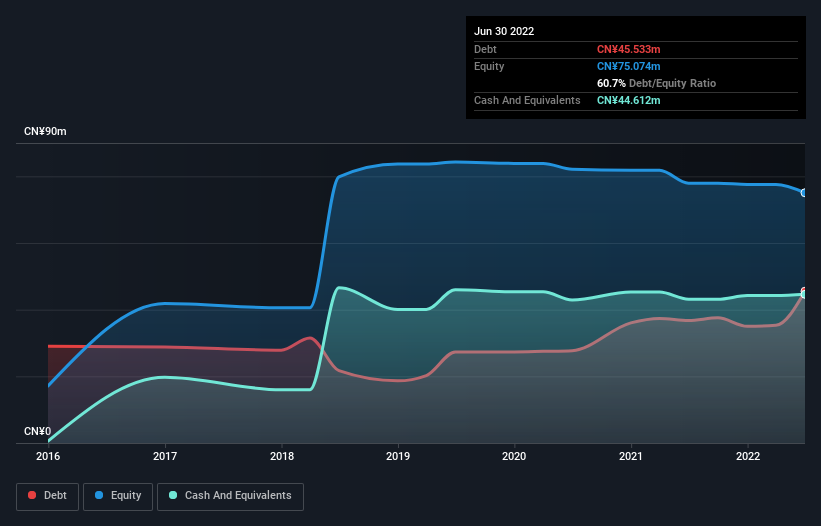
Legendary fund manager Li Lu (who Charlie Munger backed) once said, 'The biggest investment risk is not the volatility of prices, but whether you will suffer a permanent loss of capital.' It's only natural to consider a company's balance sheet when you examine how risky it is, since debt is often involved when a business collapses. Importantly, Bao Shen Holdings Limited (HKG:8151) does carry debt. But should shareholders be worried about its use of debt?
When Is Debt A Problem?
Generally speaking, debt only becomes a real problem when a company can't easily pay it off, either by raising capital or with its own cash flow. Part and parcel of capitalism is the process of 'creative destruction' where failed businesses are mercilessly liquidated by their bankers. However, a more frequent (but still costly) occurrence is where a company must issue shares at bargain-basement prices, permanently diluting shareholders, just to shore up its balance sheet. Of course, the upside of debt is that it often represents cheap capital, especially when it replaces dilution in a company with the ability to reinvest at high rates of return. The first step when considering a company's debt levels is to consider its cash and debt together.
See our latest analysis for Bao Shen Holdings
What Is Bao Shen Holdings's Net Debt?
As you can see below, at the end of June 2022, Bao Shen Holdings had CN¥45.5m of debt, up from CN¥36.8m a year ago. Click the image for more detail. However, because it has a cash reserve of CN¥44.6m, its net debt is less, at about CN¥921.0k.

A Look At Bao Shen Holdings' Liabilities
According to the last reported balance sheet, Bao Shen Holdings had liabilities of CN¥71.5m due within 12 months, and liabilities of CN¥1.88m due beyond 12 months. Offsetting this, it had CN¥44.6m in cash and CN¥41.4m in receivables that were due within 12 months. So it can boast CN¥12.6m more liquid assets than total liabilities.
This surplus suggests that Bao Shen Holdings is using debt in a way that is appears to be both safe and conservative. Because it has plenty of assets, it is unlikely to have trouble with its lenders. The balance sheet is clearly the area to focus on when you are analysing debt. But you can't view debt in total isolation; since Bao Shen Holdings will need earnings to service that debt. So when considering debt, it's definitely worth looking at the earnings trend. Click here for an interactive snapshot.
Over 12 months, Bao Shen Holdings made a loss at the EBIT level, and saw its revenue drop to CN¥128m, which is a fall of 8.8%. That's not what we would hope to see.
Caveat Emptor
Over the last twelve months Bao Shen Holdings produced an earnings before interest and tax (EBIT) loss. To be specific the EBIT loss came in at CN¥2.8m. Looking on the brighter side, the business has adequate liquid assets, which give it time to grow and develop before its debt becomes a near-term issue. Still, we'd be more encouraged to study the business in depth if it already had some free cash flow. So it seems too risky for our taste. There's no doubt that we learn most about debt from the balance sheet. But ultimately, every company can contain risks that exist outside of the balance sheet. These risks can be hard to spot. Every company has them, and we've spotted 3 warning signs for Bao Shen Holdings (of which 2 are potentially serious!) you should know about.
If, after all that, you're more interested in a fast growing company with a rock-solid balance sheet, then check out our list of net cash growth stocks without delay.
Valuation is complex, but we're here to simplify it.
Discover if Bao Shen Holdings might be undervalued or overvalued with our detailed analysis, featuring fair value estimates, potential risks, dividends, insider trades, and its financial condition.
Access Free AnalysisHave feedback on this article? Concerned about the content? Get in touch with us directly. Alternatively, email editorial-team (at) simplywallst.com.
This article by Simply Wall St is general in nature. We provide commentary based on historical data and analyst forecasts only using an unbiased methodology and our articles are not intended to be financial advice. It does not constitute a recommendation to buy or sell any stock, and does not take account of your objectives, or your financial situation. We aim to bring you long-term focused analysis driven by fundamental data. Note that our analysis may not factor in the latest price-sensitive company announcements or qualitative material. Simply Wall St has no position in any stocks mentioned.
About SEHK:8151
Bao Shen Holdings
Bao Shen Holdings Limited engages in manufacturing and processing of plastic and steel components for white goods in the People’s Republic of China.
Adequate balance sheet and slightly overvalued.
Market Insights
Community Narratives


